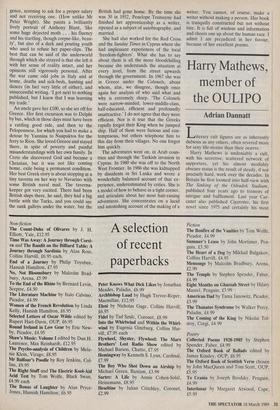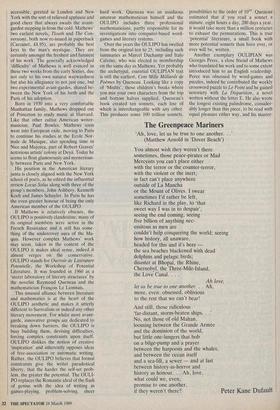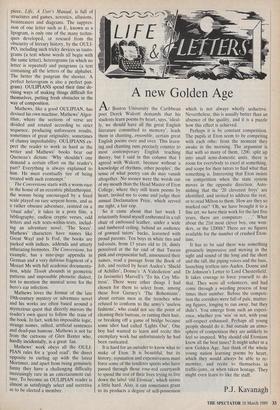Harry Mathews, member of the OULIPO
Adrian Dannatt
Literary cult figures are as inherently dubious as any others, often revered more for sexy life-stories than their oeuvre.
Harry Mathews is undeniably a cult, with his secretive, scattered network of supporters, yet his almost modishly obscure status is the result of steady, if not precisely hard, work over the decades. In Britain he first loomed into half-view with The Sinking of the Odradek Stadium, published four years ago to tremors of intrigue and bafflement. Last year Car- canet also published Cigarettes, his first novel since 1975 and certainly his most accessible, greeted in London and New York with the sort of relieved applause and good cheer that always awaits the avant- gardist stepping in from the cold. Mathews' two earliest novels, Tlooth and The Con- versions, both now re-issued in paperback (Carcanet, £4.95), are probably the best keys to the man's mystique. They are certainly amongst the freshest and funniest of his work. The generally acknowledged `difficulty' of Mathews is well evinced in these two works from the early Sixties, due not only to his own natural waywardness but also his allegiance to not just one, but two experimental avant-gardes, shared be- tween the New York of his birth and the Paris of his adoption.
Born in 1930 into a very comfortable Manhattan family, Mathews dropped out of Princeton to study music at Harvard. Like that other cultist American writer- musician, Paul Bowles, Mathews soon went into European exile, moving to Paris to continue his studies at the Ecole Nor- male de Musique, also spending time in Nice and Majorca, part of Robert Graves' notorious artists' colony at Deya. Today he seems to float glamorously and mysterious- ly between Paris and New York.
His position in the American literary junta is closely aligned with the New York school of poets, as he edited the influential review Locus Solus along with three of the group's members, John Ashbery, Kenneth Koch and James Schuyler. In Paris he has the even greater honour of being the only American member of the OULIPO.
If Mathews is relatively obscure, the OULIPO is positively clandestine; many of its original members were active in the French Resistance and it still has some- thing of the undercover aura of the Ma- quis. However complex Mathews' work may seem, taken in the context of the OULIPO it makes ideal sense, indeed it almost verges on the conservative. OULIPO stands for Ouvroir de Litterature Potentielle, the Workshop of Potential Literature. It was founded in 1960 as a 'secret laboratory of literary structures' by the novelist Raymond Queneau and the mathematician Francois Le Lionnais.
This unusual alliance between literature and mathematics is at the heart of the OULIPO aesthetic and makes it utterly different to Surrealism or indeed any other literary movement. For whilst most avant- garde, innovative groups are dedicated to breaking down barriers, the OULIPO is busy building them, devising difficulties, forcing complex constraints upon itself. OULIPO dislikes the notion of creative `inspiration' and inherently opposes ideas of free-association or automatic writing. Rather, the OULIPO believes that formal constraints give the writer paradoxical liberty, that the harder the self-set prob- lem, the greater the potential. The OULI- PO replaces the Romantic ideal of the flash of genius with the idea of writing as games-playing, problem-solving, sheer hard work. Queneau was an assiduous amateur mathematician himself and the OULIPO includes three professional mathematicians, partly responsible for its investigations into computer-based word- games and literary systems.
Over the years the OULIPO has swelled from the original ten to 25, including such luminaries as Marcel Duchamp and Italo Calvino, who was elected to membership on the same day as Mathews. Yet probably the archetypal, essential OULIPIAN text is still the earliest, Cent Mille Milliards de Poemes by Queneau. Looking like a copy of 'Misfits', those children's books where you mix your own characters from the top and bottom halves supplied, Queneau's book created ten sonnets, each line of which is interchangeable with any other. This produces some 100 trillion sonnets, possibilities to the order of 1014. Queneau estimated that if you read a sonnet a minute, eight hours a day, 200 days a year, it would take more than a million centuries to exhaust the permutations. This is true `potential' literature, a small book with more potential sonnets than have ever, or ever will be, written.
Another exemplary OULIPIAN was Georges Perec, a close friend of Mathews who translated his work and to some extent introduced him to an English readership. Perec was obsessed by word-games and puzzles, indeed he contributed the weekly crossword puzzle to Le Point and he gained notoriety with La Disparition, a novel written without the letter E. He also wrote the longest existing palindrome, consider- ably longer than this piece, to be read with equal pleasure either way, and his master- piece, Life, A User's Manual, is full of structures and games, acrostics, allusions, brainteasers and diagrams. The suppres- sion of one letter such as E, known as a lipogram, is only one of the many techni- ques developed, or rescued from the obscurity of literary history, by the OULI- PO, including such tricky devices as tauto- grams (a text whose words all begin with the same letter), heterograms (in which no letter is repeated) and pangrams (a text containing all the letters of the alphabet. The better the pangram the shorter. A perfect heterogram is also a perfect pan- gram). OULIPIANS spend their time de- vising ways of making things difficult for themselves, putting fresh obstacles in the way of composition.
Mathews, like a good OULIPIAN, has devised his own machine, Mathews' Algor- ithm, where the sections of verse are divided and rotated according to strict sequence, producing unforeseen results, sometimes of great originality, sometimes of clumsy improbability. OULIPIANS ex- pect the reader to work as hard as the writer and Mathews' books bear out Queneau's dictum: 'Why shouldn't one demand a certain effort on the reader's part? Everything is always explained to him. He must eventually tire of being treated with such contempt.'
The Conversions starts with a worm-race in the house of an eccentric philanthropist, the worms being encouraged by a fixed scale played on rare serpent-horns, and as a rather obscure adventure, centred on a `ritual adze', it takes in a porn film, a bibliography, endless cryptic verses, odd letters and rich texts-within-texts, includ- ing an adventure novel, 'The Sores'. Mathews' characters have names like Grent Wayl and Is Fod, the books are packed with indices, addenda and utterly infuriating footnotes. The Conversions, for example, has a nine-page appendix in German and a very dubious fragment of a Mozart Ms with full academic documenta- tion, while Tlooth abounds in geometric patterns and impossible phonetic dialect, not to mention the musical score for the hero's ear infection.
Mathews loves the format of the late 19th-century mystery or adventure novel and his works are often based around a mysterious quest that directly mirrors the reader's own quest to follow the train of the book. In fact, with his impossible logic, strange names, stilted, artificial sentences and dead-pan humour, Mathews is not far from the cartoons of Glen Baxter who, hardly incidentally, is a great fan.
Mathews' work obeys all the OULI- PIAN rules for a 'good read', the direct opposite to curling up with the latest Mortimer, and apart from being genuinely funny they have a challenging difficulty increasingly rare in an entertainment cul- ture. To become an OULIPIAN reader is almost as satisfyingly select and secretive as to be elected a member.




























































 Previous page
Previous page